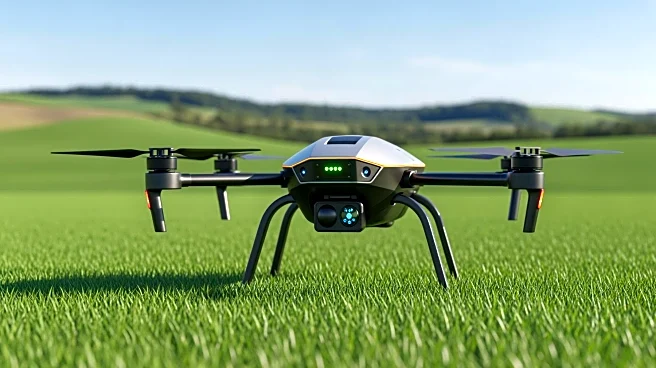What's Happening?
Bluepine Tech Foundation has launched the Global AI Smart Agriculture Service Platform, aiming to address core challenges in the agricultural sector through the integration of blockchain, artificial intelligence,
and Web3 technologies. The initiative seeks to overcome issues such as data silos, lack of financial services, and imbalanced value distribution, creating a new digital ecosystem for agriculture. The platform, known as Agri-Eco Smart Chain (AESC), offers services like data assetization, AI precision services, and a dual-driven strategy combining Real World Assets and Readable Data Assets. This approach is designed to unlock the financial potential of agricultural data, improve yields, increase income for farmers, and enhance decision-making for enterprises.
Why It's Important?
The launch of Bluepine Tech Foundation's platform is significant as it represents a major step towards digital transformation in agriculture, a sector that has been slow to adopt new technologies. By providing farmers and agricultural enterprises with tools to monetize data and improve productivity, the platform could lead to increased income and reduced financing barriers for farmers. For enterprises, the transparent and traceable data flows can streamline logistics and minimize disputes. Additionally, the platform's focus on precision agriculture promises smarter resource use and lower environmental impact, contributing to global food security. This initiative could set a precedent for integrating advanced technologies in agriculture, potentially revolutionizing the industry.
What's Next?
Bluepine Tech Foundation plans to globally promote the Agri-Eco Smart Chain platform, initiating airdrop and token sale activities to engage the community. The foundation aims to partner with research institutions, agricultural cooperatives, and blockchain innovators to establish open standards and foster cross-border collaboration. As the platform enters its promotion phase, stakeholders in the agricultural sector may begin to adopt these technologies, leading to widespread changes in how agricultural data is managed and utilized. The success of this initiative could encourage further investment and innovation in agri-tech, driving the sector towards a more sustainable and technologically advanced future.
Beyond the Headlines
The integration of blockchain and AI in agriculture raises ethical and legal considerations, particularly regarding data privacy and ownership. As farmers convert planting logs and soil data into digital assets, questions about who owns the data and how it is used become pertinent. Additionally, the platform's reliance on advanced technologies may require significant investment in infrastructure and training, posing challenges for smaller farms and enterprises. The long-term impact of this digital transformation could lead to shifts in agricultural practices, potentially affecting cultural traditions and local economies.








